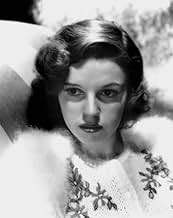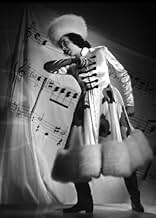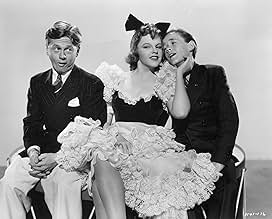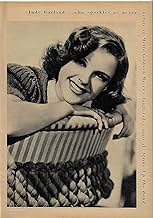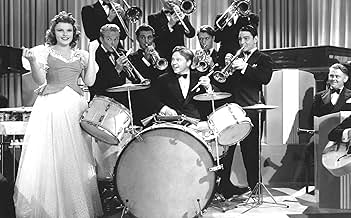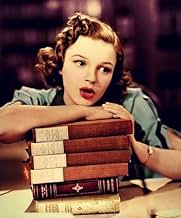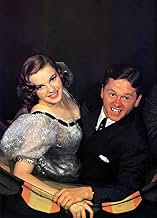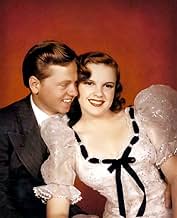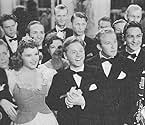IMDb RATING
6.8/10
2.1K
YOUR RATING
A high school boy wants to become a professional musician, and his gal pal wants to become his best girl. They work together staging big band shows with fellow classmates in the hopes of hit... Read allA high school boy wants to become a professional musician, and his gal pal wants to become his best girl. They work together staging big band shows with fellow classmates in the hopes of hitting it big.A high school boy wants to become a professional musician, and his gal pal wants to become his best girl. They work together staging big band shows with fellow classmates in the hopes of hitting it big.
- Won 1 Oscar
- 4 wins & 2 nominations total
Jack Baxley
- Ice Cream Concessionaire
- (scenes deleted)
Featured reviews
Overlong but fun Mickey & Judy "let's put on a show" musical, directed by the great Busby Berkeley. Drummer Jimmy (Mickey Rooney) and would-be girlfriend Mary (Judy Garland) try to make their high school band a success. Along the way they deal with little personal dramas like Jimmy's mother wanting him to be a doctor, a new girl in town who captures Jimmy's eye, and one of the band members needing an emergency operation. The musical numbers are good, if not particularly memorable. Mickey & Judy are terrific, as always. It's probably pretty corny stuff for those who aren't fans but, if you enjoy these types of movies, I'm sure you'll have a good time with this one.
Jimmy Connors (Mickey Rooney) is in the Riverwood High School band, but would like to do something more with his music. He forms a band with his friends, and would like to have the band become a dance band associated with the high school. The principal agrees and allows them to put on a dance at the school, which is a success. But when Jimmy wants to take the band to Chicago to audition for Paul Whiteman, the principal declines, saying that parents are already complaining about the band taking away from the members' studies. Will the band find a way to finance that trip? Of course they do! The complications are in how they manage to do it and the adversity thrown in their path along the way.
The complications include Jimmy's mother having her heart set on him becoming a doctor, like his late father, collaborator and singer for the band, Mary Holden (Judy Garland), wanting more out of her relationship than being Jimmy's "gal pal", and a newcomer to the high school being a female barracuda with her heart set on nabbing an unwilling but polite Jimmy.
This didn't have much of a plot attached, but the music is terrific. It's a bit overlong for the material at two hours, but that includes a fantastic finale. Director Busby Berkeley was responsible for bringing film choreography into the modern era with his stage numbers that could never be performed on the stage over at early 30s Warner Brothers. Here he has the same tendency when he choreographs and stages the finale, but just go with it and enjoy the spectacle.
I really liked the stop-motion number where the fruit on the kitchen table danced. The Conga number was full of energy and delightful, and the scene in which Garland sings to herself in the library was charming. I even liked the spoof of old-time melodrama. (Somebody must have liked "That Fatal Glass of Beer.")
The complications include Jimmy's mother having her heart set on him becoming a doctor, like his late father, collaborator and singer for the band, Mary Holden (Judy Garland), wanting more out of her relationship than being Jimmy's "gal pal", and a newcomer to the high school being a female barracuda with her heart set on nabbing an unwilling but polite Jimmy.
This didn't have much of a plot attached, but the music is terrific. It's a bit overlong for the material at two hours, but that includes a fantastic finale. Director Busby Berkeley was responsible for bringing film choreography into the modern era with his stage numbers that could never be performed on the stage over at early 30s Warner Brothers. Here he has the same tendency when he choreographs and stages the finale, but just go with it and enjoy the spectacle.
I really liked the stop-motion number where the fruit on the kitchen table danced. The Conga number was full of energy and delightful, and the scene in which Garland sings to herself in the library was charming. I even liked the spoof of old-time melodrama. (Somebody must have liked "That Fatal Glass of Beer.")
Being a huge lifelong fan of Judy Garland, with a voice that you can listen to for hours and tire of, and who likes her paired with Mickey Rooney (a multi-talented performer with a tendency to overdo it), 'Strike Up the Band' was definitely something that couldn't be missed.
To me, 'Strike Up the Band' is the second best of their four "backyard" musicals. Their best being 'Girl Crazy', the best paced of the four and with the best songs and choreography, even if the story is not as good as the rest of the film. Faring weakest is 'Babes on Broadway' ('Babes in Arms' was a slightly better film regardless of its bowdlerisation of the source material), that film gets a lot right still but is too sentimental, contrived and corny in places with some out of place patriotism and a sour-taste-in-the-mouth finale. All four are worth watching though, and all four are well above average films.
'Strike Up the Band' is not perfect either, its Achilles heel being the far too corny, melodramatic and ponderous middle third (a shame because the film is actually very well paced for most of it and then drags badly in the non-musical moments of the middle third). The dialogue warms the heart and moves sometimes but the silly corniness of some of it is cringe-worthy.
Lastly while the cast are mostly splendid, there is one exception and that is the terribly annoying June Preisser (just as much as in 'Babes in Arms'), enviously athletic dancing is not enough for an obnoxious character played far too broadly to unbearable degrees.
However, even when not in Technicolor, 'Strike Up the Band' still looks lovely in crisp black and white and with elegant production design. As said, on the musical front (production values, songs, vocal performance, arrangements, choreography and dancing) 'Strike Up the Band' fares significantly better. The songs are great, not as great as the scores for 'Girl Crazy' and 'Babes in Arms' but almost. The three best songs being the plaintive "Our Love Affair", the exuberant "Drummer Boy" and the barn-storming "Do the La Conga".
Busby Berkeley's direction and how he stages the songs are not quite as imaginative, witty or dazzling as some of his other films, but it doesn't come over heavy-handedly and it has charm, tenderness and energy, particularly in the aforementioned three songs. Unlike 'Babes on Broadway', sentimentality is avoided thankfully and is replaced by a lot of entertainment and heart-warming. The story is unexceptional but is full of energy, fun, heart and charm, palling only in the non-musical moments of the middle third.
Rooney and Garland make 'Strike Up the Band' especially worth seeing, they are both on top form and their chemistry irresistible. From personal opinion, of the four Rooney-Garland "back-yard" musicals (despite 'Babes in Arms' being the one to get the Oscar nomination) this contains Rooney's best performance of the four, his role really plays to his strengths and even stretches him in showing more talents that one never knew he had (i.e. didn't know he could play the drum so well). Garland is as ever radiant and deeply touching, "Our Love Affair" being one of the most poignant renditions of any song in a film she starred in (very near the top too, and the list is long). Paul Whiteman, not the "King of Jazz" for nothing, contributes hugely to the film's appeal too.
Overall, a thoroughly enjoyable film, a must for Garland fans and a must for anybody wanting to see what the fuss is about with her and Rooney together. 7/10 Bethany Cox
To me, 'Strike Up the Band' is the second best of their four "backyard" musicals. Their best being 'Girl Crazy', the best paced of the four and with the best songs and choreography, even if the story is not as good as the rest of the film. Faring weakest is 'Babes on Broadway' ('Babes in Arms' was a slightly better film regardless of its bowdlerisation of the source material), that film gets a lot right still but is too sentimental, contrived and corny in places with some out of place patriotism and a sour-taste-in-the-mouth finale. All four are worth watching though, and all four are well above average films.
'Strike Up the Band' is not perfect either, its Achilles heel being the far too corny, melodramatic and ponderous middle third (a shame because the film is actually very well paced for most of it and then drags badly in the non-musical moments of the middle third). The dialogue warms the heart and moves sometimes but the silly corniness of some of it is cringe-worthy.
Lastly while the cast are mostly splendid, there is one exception and that is the terribly annoying June Preisser (just as much as in 'Babes in Arms'), enviously athletic dancing is not enough for an obnoxious character played far too broadly to unbearable degrees.
However, even when not in Technicolor, 'Strike Up the Band' still looks lovely in crisp black and white and with elegant production design. As said, on the musical front (production values, songs, vocal performance, arrangements, choreography and dancing) 'Strike Up the Band' fares significantly better. The songs are great, not as great as the scores for 'Girl Crazy' and 'Babes in Arms' but almost. The three best songs being the plaintive "Our Love Affair", the exuberant "Drummer Boy" and the barn-storming "Do the La Conga".
Busby Berkeley's direction and how he stages the songs are not quite as imaginative, witty or dazzling as some of his other films, but it doesn't come over heavy-handedly and it has charm, tenderness and energy, particularly in the aforementioned three songs. Unlike 'Babes on Broadway', sentimentality is avoided thankfully and is replaced by a lot of entertainment and heart-warming. The story is unexceptional but is full of energy, fun, heart and charm, palling only in the non-musical moments of the middle third.
Rooney and Garland make 'Strike Up the Band' especially worth seeing, they are both on top form and their chemistry irresistible. From personal opinion, of the four Rooney-Garland "back-yard" musicals (despite 'Babes in Arms' being the one to get the Oscar nomination) this contains Rooney's best performance of the four, his role really plays to his strengths and even stretches him in showing more talents that one never knew he had (i.e. didn't know he could play the drum so well). Garland is as ever radiant and deeply touching, "Our Love Affair" being one of the most poignant renditions of any song in a film she starred in (very near the top too, and the list is long). Paul Whiteman, not the "King of Jazz" for nothing, contributes hugely to the film's appeal too.
Overall, a thoroughly enjoyable film, a must for Garland fans and a must for anybody wanting to see what the fuss is about with her and Rooney together. 7/10 Bethany Cox
"Strike Up the Band" is another teaming of Mickey Rooney and Judy Garland who are of course put in the position of putting on a show to save a band, a school program for children, a school from closing, etc. You name it. It could be any of those things. Of all the movie musicals that were made in their heyday, these were the most bizarre, meaning while enjoyable and with good music still somewhat beyond belief. They always seemed to defy the odds, getting what they want, albeit with some obstacles along the way. This outing though is not quite as good as others, due to some of the supporting actors' not so subtle acting. Less is more is not an adage used here. In fact, there's nothing subtle here. Ann Shoemaker does give good support as his mother, with a nice speech about being a great man. But the length, its feeling of self-importance, and some awkward moments of corniness hurt its effectiveness. It is very enjoyable with great musical numbers for Mickey and Judy; but there's just so much of everything here, making it two whole hours, including a over-the-top tongue-in-cheek save-the-damsel production in the middle of the movie, lasting 15 minutes itself. I'm sure you'll enjoy it for what it is, but afterwards, you'll feel like you had a workout.
Admittedly, I'm not the best judge of musicals, but this one seems disappointing given the level of talent involved. Visually, Garland and Rooney make a cute couple-- a match clearly made in malt shop heaven. And, even though I was disappointed, I can understand Garland's enduring appeal. She's definitely an incandescent presence, and one that doesn't come from just acting the part. On the other hand, Rooney is energetic and I can see him organizing a high school band. However, that energy too often becomes manic—for example, check out his conducting the orchestra at movie's end for sheer pointless delirium. Too often, his in- your-face high spirits comes across as more obnoxious than entertaining.
I guess my biggest disappointment is with the musical numbers. Berkeley's dancing phalanxes are eye-catching as usual, but there's not a single catchy tune to hang your hat on. The numbers are simply not up to Garland's level of show-stopping talent, whatever the reason. Then there's the overlong melodrama skit that unfortunately saps momentum by coming in the middle. On the other hand, the musical fruit sketch sounds silly but is really charming and well done. Also, professional musician Paul Whiteman turns out to be a pretty darn good actor. And for those interested in what those times were like, it's a chance to see what teens circa-1940 thought was "cool". Having your own dance band was clearly near the top. At the same time, the message seems to be that dance bands deserve respect, while playing in one is indeed a legitimate goal in life. Looks like controversies over music didn't start with rock-and-roll.
I guess my biggest disappointment is with the musical numbers. Berkeley's dancing phalanxes are eye-catching as usual, but there's not a single catchy tune to hang your hat on. The numbers are simply not up to Garland's level of show-stopping talent, whatever the reason. Then there's the overlong melodrama skit that unfortunately saps momentum by coming in the middle. On the other hand, the musical fruit sketch sounds silly but is really charming and well done. Also, professional musician Paul Whiteman turns out to be a pretty darn good actor. And for those interested in what those times were like, it's a chance to see what teens circa-1940 thought was "cool". Having your own dance band was clearly near the top. At the same time, the message seems to be that dance bands deserve respect, while playing in one is indeed a legitimate goal in life. Looks like controversies over music didn't start with rock-and-roll.
Did you know
- TriviaThe original camera negative was destroyed in May 1978 during a nitrate film fire in the George Eastman House archives. The fire also destroyed 328 other films' original camera negatives.
- GoofsIn an anachronism typical of movie musicals of the time, when Mickey and Judy's band wins the competition, it is announced that musicians, singers and dancers from the various competing orchestras will perform an impromptu big number together. Even though they've never met before, nor rehearsed, nor had even five minutes to create sets and costumes, everything comes off seamlessly and with M-G-M's usual level of polish.
- Quotes
Paul Whiteman: Take that little fellow on the street. Teach him to blow a horn and he'll never blow a safe.
- ConnectionsEdited into Hollywood: The Dream Factory (1972)
- SoundtracksStrike Up the Band
(1927)
Music by George Gershwin
Lyrics by Ira Gershwin
Played during the opening credits
Sung by Judy Garland (uncredited), Mickey Rooney (uncredited), and chorus in the finale
- How long is Strike Up the Band?Powered by Alexa
Details
- Release date
- Country of origin
- Language
- Also known as
- Armonías de juventud
- Filming locations
- Production company
- See more company credits at IMDbPro
Box office
- Budget
- $838,661 (estimated)
- Runtime2 hours
- Color
- Aspect ratio
- 1.37 : 1
Contribute to this page
Suggest an edit or add missing content


